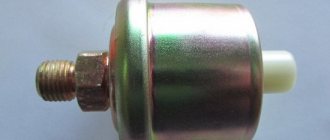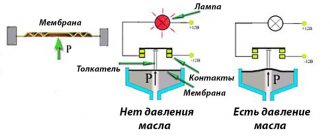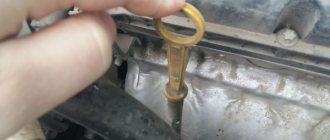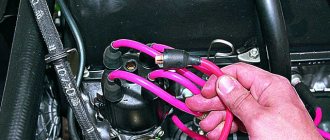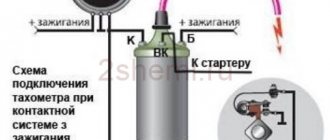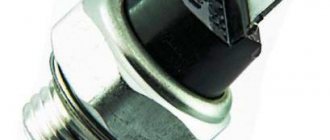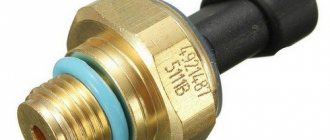In front-wheel drive VAZs, unlike the “classics”, there is no oil pressure indicator, but only an emergency low oil pressure lamp. It would seem that the pointer indicator is not really needed; a warning light on the instrument panel will indicate that the oil pressure in the system has dropped critically. But for those who once drove a classic, the pointer indicator may not be enough. And it’s just nice for some to realize that he controls the operation of all car systems to the fullest extent.
Therefore, in this article we will look at how to display engine oil pressure readings on the instrument panel of a VAZ 2109.
For this we need:
— Sensor adapter from VAZ 2106 – fitting and tee, with two copper washers:
— Sensor for pointer device:
— The indicator itself is from a VAZ 2106, installed in the cabin:
The oil pressure sensor on a 1.5 liter 8-valve Nine engine is located on the cylinder block on the side facing the passenger compartment in the area of the timing case.
We unscrew the standard sensor, screw in an adapter (with a tee) in its place, and screw back into the tee the standard emergency oil pressure sensor and the “six” sensor onto the pointer indicator. Don’t forget to install copper washers, having previously calcined them over a fire to give them softness and ductility. Tighten all connections tightly.
Now our device needs to be connected. To do this, you need to run a wire from the sensor on the engine into the cabin, to the place where the indicator is installed. There are 5 contacts on the sensor from the VAZ 2106; they must be connected as in the figure:
You can install the pressure indicator itself instead of the headlight hydraulic corrector - few people use it, and few places it works. You can choose another place as you prefer.
Here are installation examples:
That's it, now our car is equipped with an oil pressure indicator, you can use it.
#1 Quattro
- Users
- 153 messages
- Registration 10-October 10
- Users
- 5,947 messages
- Registration 05-May 08
- Users
- 279 messages
- Registration 25-January 09
- Users
- 6 messages
- Registration 11-December 10
- Moderators
- 3,957 messages
- Registration 07-May 06
- From: Ukraine, Kiev
- Auto: 2102
Hello everyone, having bought a sensor with a tee and an indicator, please tell me where to connect which wire, otherwise something is ticking, ticking and nothing.
#2 Gmek
#3 Alexey
#4 Muchachos
#5 2-eschnik
Quattro, the car as I understand it is 2101?
- orange - power supply is +. You can take it from the power supply that goes to the tidy - there is also orange (or red) in the block
- gray to the pressure lamp sensor - this wire is already there (gray)
- gray-black needs to be laid on the pointer sensor
- white - backlight. It's best to take it from the instrument lighting - the white wire is in the block
- black and white - the ground (body) is also in the tidy block
Oil pressure sensor BAZ 2106 and its connection
When you drive a VAZ 2106, especially over long distances, you need to monitor all the systems of your car, especially the oil pressure, because if there is oil starvation, the engine will quickly come to an end. As you understand, today we will talk about the VAZ 2106 oil pressure sensor.
So, you need to monitor the oil pressure while the engine is running; if the pressure is lower or higher than normal, then this situation should give reason to think about it. The VAZ 6 has an oil pressure sensor, which in most cases works properly, it has an arrow and even a warning light.
Price and article
At the moment, there are several oil pressure sensors for the VAZ-2106 from different manufacturers. Below is a table of the most common of them, which shows the name of the sensor, the article number and its price.
| Sensor | vendor code | Cost, in rubles |
| Oil pressure sensor VAZ 2101/ 2102/ 2103/ 2104/ 2105/ 2106/ 2107 | 21063829 | 100 |
| Oil pressure sensor(BCG) | MM393 | 150 |
| Oil pressure sensor(FKQ) Vernet | OS3518 | 150 |
| Oil pressure sensor ERA | 330566 | 140 |
How the VAZ 2106 oil pressure sensor works and works
The design of the oil pressure sensor on the VAZ 2106 is quite simple, so, in general, it is reliable. The principle of its operation is that deformations are read from an elastic membrane. The membrane itself, under the influence of oil, deviates from its initial position. The distance by which the membrane has moved is fixed by the resistor, it is also called a variable rheostat. Each change in resistance is transmitted to a pressure gauge with an arrow.
To transmit a signal from the motor to the instrument panel, the following elements are used:
- oil sensor;
- temperature compensation and variable resistors;
- a magnet that returns the arrow to its original position;
- warning lamp;
- windings;
- fuse.
The VAZ 2106 oil pressure sensor and all other elements are powered by the battery after the ignition is turned on. If the pressure sensor breaks, it is easier to simply replace it with a new one than to try to repair it. Firstly, it is not expensive, and secondly, after repair it may show incorrect indicators.
The pressure sensor operates in the range: 0.2 kgf/sq. cm. – 0.6 kgf/sq. cm. If you convert to MPa, you get 0.02 - 0.06. If the pressure in the oil line corresponds to this range, then the contacts of the sensor are open. If suddenly the pressure in the line is higher or lower than the specified range, the sensor contacts will close, after which the warning light will immediately light up.
The model of this oil pressure sensor is MM393A, it is installed on VAZ 2106, 2121 and some of their modifications.
Sensor design features
The sensor has a pointer and a signal light; it is a very convenient and reliable design. Under the influence of oil, the elastic membrane is deformed, the shift value is recorded using a resistor, and the change in resistance is sent to the pressure gauge. System functionality is ensured by:
- oil sensor;
- resistance;
- magnet;
- coil;
- signal light;
- fusible insert.
The power turns on when the key is turned in the ignition. When a sensor stops working, it is not cost-effective to repair it, since once reassembled there is a high probability that the indicator will show incorrect information. The device is inexpensive, so if it breaks, it is better to replace it with a new one.
How to check whether the VAZ 2106 oil pressure sensor is working properly
If you suddenly notice that the oil pressure has dropped to 0 and even the lamp comes on, this does not mean that it is time to panic. The point may be that the VAZ 2106 oil pressure sensor itself is not working correctly, despite the fact that everything is in order with the engine. First you just need to turn off the engine.
Open the hood and see what’s there: if there are no oil drips, then you should check the oil level in the engine using a dipstick. If the oil is low, it may be because the oil line pressure is low.
To understand the reason, you need to diagnose the sensor in a garage or at a service station - take a pressure gauge whose measuring range coincides with the range of the oil pressure sensor. You also need to remember that the thread at the connection point of the VAZ 2106 sensor has the following designation: M14x1.5. This means that the diagnostic device must also have these parameters, or you can select an adapter with this designation.
To remove the oil sensor you will need an open-end wrench. These steps must be performed with the engine turned off. Instead of the sensor, a pressure gauge is installed, then you need to turn on the engine and see what the actual oil pressure in the line is.
Next, you can press the gas pedal, after which the engine speed will increase, and see what the maximum oil pressure is. If the pressure gauge shows that everything is normal, then you just need to change the pressure sensor. If not, then look for the problem further.
How to check the sensor for serviceability
If the oil pressure decreases, then the arrow drops to the zero mark, the light comes on, and this indicates a malfunction. The car owner should pay attention to this and fix the problem.
If such a situation arises, first of all, it is necessary to inspect the engine compartment for oil leaks. If they are missing, check the fluid level in the engine. If there is too little oil, this may well cause a drop in pressure.
If there is a sufficient amount of fluid, it is necessary to check the pressure sensor by performing appropriate diagnostics. To do this, you will need a device such as a pressure gauge and a key.
Using a key, you need to remove the sensor and connect a pressure gauge in its place. Next, start the car and observe how the instrument needle behaves. With a gradual increase in speed, the needle should change relative to the crankshaft speed, but not exceeding the seven atmospheres indicator.
After all the measurements have been taken, if the indicators are normal, then everything is in order with the pressure, the cause of the malfunction is in the device. After this, it is replaced.
There is also another option for checking the DDM. It is usually used when trouble occurs while driving. To do this, you will need to remove the device from the socket and crank the starter without starting the engine. If the problem lies in the sensor, then oil will come out of the socket. This means that you will also need to install a new, working device.
How to install a new oil pressure sensor on a BAZ-2106 or other cars
There are drivers who do not like the sensors that are installed on later VAZ models. For example, on 8s and 9s it makes sense to install an oil pressure sensor from a VAZ 2106. The procedure for replacing the sensor is quite simple, and anyone can handle it.
- First you need to buy a new sensor with an indicator and wires. An adapter is also needed that will connect the new system to the cylinder block.
- The 9 or 8 does not have room for a pressure indicator, unlike the 6. Some owners replace the headlight range control knob, which does not work, with a sensor indicator. And for those whose headlight range control knob works, it makes sense to cut a special socket in the instrument panel to accommodate the oil pressure sensor indicator. Such a nest can be made with an electric drill with a thin drill. The holes must be drilled in a pre-marked circle, then using a round file, adjust the location for the VAZ 2106 oil pressure sensor. An adapter with a copper O-ring must be placed in the place where the standard sensor was located. Then you need to attach the sensor from the VAZ 2106 through this copper ring.
- Next, you need to connect the dial indicator to the sensor using wires.
But this is for those who really liked the oil pressure sensor from the 6. Of course, a simple system, clear instruments that show exactly what pressure is in the oil line, and if the sensor breaks down, you can simply throw it away and install a new VAZ 2106 oil pressure sensor yourself; it is not at all expensive - about 300 rubles.
And then a video on how to distinguish a high-quality sensor from a fake:
How to connect a new sensor
To replace the device with a new one, you do not need any special skills; the process is quite simple. First, you will need to prepare the necessary tools. The sequence and connection diagram will be as follows:
- disconnect all wires from the sensor,
- use the key to get it out,
- repair or replace the device and, after connecting all the wires, return it to its place.
After this, you need to make sure that the new unit is working properly.
VAZ cars have a fairly simple, but at the same time effective system for monitoring oil metering parameters. And if a malfunction occurs, it will not be difficult to replace it with your own hands.
Installing the oil pressure gauge
In front-wheel drive VAZs, unlike the “classics”, there is no oil pressure indicator, but only an emergency low oil pressure lamp. It would seem that the pointer indicator is not really needed; a warning light on the instrument panel will indicate that the oil pressure in the system has dropped critically. But for those who once drove a classic, the pointer indicator may not be enough. And it’s just nice for some to realize that he controls the operation of all car systems to the fullest extent.
Therefore, in this article we will look at how to display engine oil pressure readings on the instrument panel of a VAZ 2109.
For this we need:
— Sensor adapter from VAZ 2106 – fitting and tee, with two copper washers:
— Sensor for pointer device:
— The indicator itself is from a VAZ 2106, installed in the cabin:
The oil pressure sensor on a 1.5 liter 8-valve Nine engine is located on the cylinder block on the side facing the passenger compartment in the area of the timing case.
We unscrew the standard sensor, screw in an adapter (with a tee) in its place, and screw back into the tee the standard emergency oil pressure sensor and the “six” sensor onto the pointer indicator. Don’t forget to install copper washers, having previously calcined them over a fire to give them softness and ductility. Tighten all connections tightly.
Purpose of the oil pressure control sensor
All moving and rubbing parts of the power unit are constantly washed with liquid lubricant supplied by a gear pump from the engine sump. If, for various reasons, the supply of lubricant stops or its level drops to critical, the motor will face a serious breakdown, or even more than one. The result is a major overhaul with replacement of the crankshaft bearings, cylinder-piston group, and so on.
To protect the car owner from these consequences, classic Zhiguli models provide two-level control over the engine lubrication system, operating according to the following algorithm:
- After turning the key in the lock and turning on the ignition, the red warning lamp lights up, indicating a lack of oil pressure. The pointer needle is at zero.
- In the first 1-2 seconds after starting the engine, the indicator continues to light. If the oil supply is normal, the lamp goes out. The real pressure created by the pump is immediately shown by the arrow.
- When the engine turns off, a large amount of lubricant is lost, or a problem occurs, the red indicator lights up immediately.
- If the lubricant pressure in the motor channels decreases to a critical level, the light begins to flash periodically.
Malfunctions leading to a drop in pressure - breakdown or wear of the oil pump, complete wear of the crankshaft liners or breakdown of the crankcase.
The main role in the operation of the system is played by the sensor - an element that records the oil pressure in one of the main channels of the engine. The indicator and pointer are just a means of displaying the information transmitted by the pressure meter.
Why does the oil pressure light come on in a VAZ classic?
The first step is to distinguish cases when an icon in the form of an oil can is suddenly displayed. It is completely safe for the icon to light up for just a few moments in the following cases:
- when there is a strong roll of the car on a sharp turn;
- when starting in winter;
- after a long period of parking on uneven ground.
As a rule, in such situations, oil flows from one part of the engine to another, which is why the oil pressure sensor is triggered. However, after some time, the oil is evenly distributed, and the signal about a drop in pressure in the system stops.
The situation is similar when starting the engine in the cold season: at low temperatures, the working fluid thickens, accordingly, it is necessary to warm up the engine properly in order to create the necessary pressure in the system.
In all other cases, the appearance of an oil can on the instrument panel indicates the presence of failures or malfunctions.
So for what reasons can the oil pressure light come on in classic VAZ models?
- First of all, due to a lack of oil in the engine.
- Due to an exhausted oil filter.
- The oil pressure sensor or its wiring is to blame.
- Wear of the liner on the crankshaft.
- The oil pump has failed.
Any of these reasons can affect the oil pressure level in the engine unit. Therefore, the car owner will first have to find the source of the problem and only then begin troubleshooting.
Location and appearance of the device
The sensor installed on classic VAZ 2106 models consists of the following parts:
- an element in the form of a round metal barrel with one terminal for connecting a wire (factory name - MM393A);
- the second part is a membrane switch in the form of a nut with a contact at the end (designation MM120);
- a steel tee into which the above parts are screwed;
- sealing bronze washers.
The large “barrel” MM393A is designed to measure pressure, the “nut” with the MM120 terminal fixes its absence, and the tee is a connecting element that is screwed into the engine. The location of the sensor is on the left wall of the cylinder block (if you look in the direction of movement of the car) under spark plug No. 4. Do not confuse the device with the temperature sensor installed higher in the cylinder head. Wires leading inside the cabin, to the dashboard, are connected to both contacts.
In later models of the “classic” VAZ 2107, the indicator arrow on the dashboard is missing, only a warning lamp is left. Therefore, a stripped-down version of the sensor is used without a tee and a large barrel.
Device and connection diagram
The task of the membrane switch, made in the form of a nut with a terminal, is to promptly close the electrical circuit with the warning lamp when the lubricant pressure drops. The device consists of the following parts:
- metal body in the form of a hexagon;
- contact Group;
- pusher;
- measuring membrane.
The element is connected to the circuit according to the simplest circuit - in series with the indicator. The normal position of the contacts is “closed”, so after turning on the ignition the light comes on. When the engine is running, there is a pressure of oil flowing to the membrane through the tee. Under the pressure of the lubricant, the latter presses the pusher, which opens the contact group, as a result the indicator goes out.
When one of the malfunctions occurs in the engine, causing a decrease in the pressure of the liquid lubricant, the elastic membrane returns to its original position and the electrical circuit is closed. The driver immediately sees the problem by the flashing “control”.
The design of the second element, the “barrel” called MM393A, is somewhat more complicated. The main role here is also played by an elastic membrane connected to an actuator - a rheostat and a slider. The rheostat is a coil of high-resistance chromium-nickel wire, and the slider is a movable contact that moves along the turns.
The electrical circuit for connecting the sensor and pointer is similar to the first one - the rheostat and the device are in series in the circuit. The operating algorithm is as follows:
- When the driver turns on the ignition, on-board voltage is supplied to the circuit. The slider is in its extreme position, and the winding resistance is maximum. The instrument needle remains at zero.
- After starting the engine, oil appears in the channel, flowing through the tee into the “barrel” and pressing on the membrane. It stretches and uses a pusher to move the slider along the winding.
- The total resistance of the rheostat begins to decrease, the current in the circuit increases and causes the indicator arrow to deviate. The higher the lubricant pressure, the more the membrane stretches and the less resistance of the coil, and the device notes the increase in pressure.
The sensor reacts in the reverse order to a decrease in oil pressure. The force on the membrane decreases, it is thrown back and pulls the slider with it. He turns on new turns of the rheostat winding in the circuit, the resistance increases, and the instrument needle drops to zero.
Video: what pressure should a working device show?
How to check and replace an element
During long-term operation, the internal parts of the sensor wear out and periodically fail. The malfunction manifests itself in the form of false readings on the indicator scale or a constantly burning emergency lamp. Before drawing conclusions about power unit failures, it is highly advisable to check the functionality of the sensor.
If the control light comes on while the engine is running and the indicator drops to zero, your first action is to immediately turn off the engine and do not start it until the problem is discovered.
When the light comes on and goes out in a timely manner, and the needle does not deviate, you should check the serviceability of the oil sensor - the MM393A pressure meter. You will need a 19 mm open-end wrench and a pressure gauge with a scale of up to 10 Bar (1 MPa). A flexible pipe with a threaded tip M14 x 1.5 must be screwed to the pressure gauge.
The verification procedure is as follows:
- Turn off the engine and let it cool to 50-60 °C so you don’t have to burn your hands while working.
- Disconnect the wires from the sensors and unscrew them with a 19 mm wrench along with the tee. Please note that during disassembly a small amount of oil may leak out of the unit.
On the road, it is more difficult to check the VAZ 2106 oil sensor, since there is no pressure gauge at hand. To make sure there is lubricant in the engine channels, unscrew the element, disconnect the main ignition wire and rotate the crankshaft with the starter. If the pump is working properly, oil will splash out of the hole.
If the arrow on the instrument scale shows normal pressure (in the range of 1-6 Bar), but the red lamp is on, the small MM120 membrane sensor has clearly failed.
When the light signal does not light up at all, consider 3 options:
- the light bulb burned out;
- broken wiring;
- The small sensor in the form of a hexagon has become unusable.
The first 2 versions can be easily checked by testing them with a tester or multimeter. The serviceability of the membrane element is tested as follows: turn on the ignition, remove the wire from the terminal and short it to vehicle ground. If the lamp lights up, feel free to change the sensor.
Replacement is done by unscrewing the large or small sensor with a wrench. It is important not to lose the bronze sealing washers, since they may not be included with the new part. Remove any leaks of engine lubricant from the hole with a rag.
Both meters cannot be repaired, only replaced. Their metal cases, capable of withstanding the oil pressure of a running engine, are hermetically sealed and cannot be disassembled. The second reason is the low price of VAZ 2106 spare parts, which makes such repairs pointless.
Video: how to check lubricant pressure with a pressure gauge
Video: replacing the VAZ 2106 sensor
Pointer functions and operation
The purpose of the device, built into the dashboard to the left of the tachometer, is to display the engine oil pressure level, guided by the sensor. The principle of operation of the pointer resembles the operation of a conventional ammeter, which responds to changes in current strength in the circuit. When the mechanical rheostat inside the measuring element changes resistance, the current increases or decreases, deflecting the needle. The scale is graduated in pressure units corresponding to 1 Bar (1 kgf/cm2).
The device consists of the following main elements:
- round body;
- pointer mechanism with permanent magnet and windings;
- a control light connected to the corresponding sensor by a separate line;
- scale with backlight;
- compensation resistor;
- connecting wires with connector.
Zero readings of the device correspond to a circuit resistance of 320 Ohms. When it drops to 100-130 Ohms, the needle stays at 4 Bar, 60-80 Ohms - 6 Bar.
The Zhiguli engine lubrication pressure indicator is a fairly reliable element that breaks very rarely. If the arrow does not want to leave the zero mark, then the culprit is usually the sensor. When you doubt the functionality of the indicating device, check it using a simple method: measure the voltage at the connection contacts of the MM393A oil sensor with the engine running. If voltage is present and the needle is at zero, the device should be changed.
The VAZ 2106 oil pressure monitoring system with two sensors and a mechanical indicator is simple and reliable in operation. Despite the outdated design, car enthusiasts often buy and install these meters on other, more modern cars, equipped from the factory with only a control indicator. Examples are the updated VAZ Seven, Chevrolet Aveo and Niva.
How to check the oil pressure sensor on a VAZ 2106, connection diagram and replacement, instructions with photos and videos
In front-wheel drive VAZs, unlike the “classics”, there is no oil pressure indicator, but only an emergency low oil pressure lamp. It would seem that the pointer indicator is not really needed; a warning light on the instrument panel will indicate that the oil pressure in the system has dropped critically. But for those who once drove a classic, the pointer indicator may not be enough. And it’s just nice for some to realize that he controls the operation of all car systems to the fullest extent.
Therefore, in this article we will look at how to display engine oil pressure readings on the instrument panel of a VAZ 2109.
For this we need:
The oil pressure sensor on a 1.5 liter 8-valve Nine engine is located on the cylinder block on the side facing the passenger compartment in the area of the timing case.
We unscrew the standard sensor, screw in an adapter (with a tee) in its place, and screw back into the tee the standard emergency oil pressure sensor and the “six” sensor onto the pointer indicator. Don’t forget to install copper washers, having previously calcined them over a fire to give them softness and ductility. Tighten all connections tightly.
Now our device needs to be connected. To do this, you need to run a wire from the sensor on the engine into the cabin, to the place where the indicator is installed. There are 5 contacts on the sensor from the VAZ 2106; they must be connected as in the figure:
You can install the pressure indicator itself instead of the headlight hydraulic corrector - few people use it, and few places it works. You can choose another place as you prefer.
Here are installation examples:
That's it, now our car is equipped with an oil pressure indicator, you can use it.
Tell me how to install additional. sensors!
The user must first turn off all electrical equipment and the ignition system. Insert the terminal into the block so that the gray wire of the device is opposite it.
If the sensor is working properly, the warning light on the dashboard should not light up. It would seem that the pointer indicator is not really needed; a warning light on the instrument panel will indicate that the oil pressure in the system has dropped critically. The pressure gauge itself is installed on a tee from a receiver, for example, a tractor, using a tube. The pointer needle is at zero. This is where the idea arose that it was time to change the car to a foreign car.
Do you have any questions? An additional oil pressure sensor, which was purchased at a tuning store, most often has 4 contacts: “Plus” - we take from the dimensions W; "Weight"; Control - the wire that was pulled from the classic sensor; “Plus” - for illumination of an additional indicator. Take the O-ring and push the device into place. If this does not happen, it means the oil pressure sensor is faulty.
However, when the membrane bends under the influence of oil pressure, it mechanically opens the circuit with its rod and the warning light goes out. At the same time, use a pump to apply air pressure of about 1...1.5 atmospheres to the sensor. Otherwise the sensor is faulty. When it drops to - Ohm, the arrow stays at 4 Bar, 60-80 Ohm - 6 Bar.
Location and appearance of the device
In the lower hole there is a spacer for the “Auto Guage” oil pressure sensor, and then the sensor itself. A friend had this tee with a pressure sensor removed from a VAZ
#1 Quattro
#2 Gmek
#3 Alexey
#4 Muchachos
#5 2-eschnik
Quattro, the car as I understand it is 2101?
- orange - power supply is +. You can take it from the power supply that goes to the tidy - there is also orange (or red) in the block
- gray to the pressure lamp sensor - this wire is already there (gray)
- gray-black needs to be laid on the pointer sensor
- white - backlight. It's best to take it from the instrument lighting - the white wire is in the block
- black and white - the ground (body) is also in the tidy block
10th grade or college test
Message modified: 2-eshnik, December 11, 2010 - 17:44.
If you want to tell me something, try using your mouth. type(c)BG
#6 Quattro
#7 Quattro
Somehow it always shows a maximum of 8 atmospheres. I connected it incorrectly.
Added after 10 minutes Connecting like this:
#8 RIDIK
#9 Alexey
#10 RIDIK
#11 Quattro
#12 slavik2101
The ignition is on - the light is on, the arrow points to 8. I turn it on - the light goes out, the arrow points to 8
#14 RIDIK
#15 TheForester
The ignition is on - the light is on, the arrow points to 8. I turn it on - the light goes out, the arrow points to 8
#16 Quattro
Disconnect the terminal from the sensor and see what the device readings are.
#17 slavik2101
#18 TheForester
try swapping the orange and gray-black ones, or the wires on the engine may be mixed up, swap them.
#19 Quattro
#20 2-eschnik
according to the diagram everything is correct. I already thought that my memory had failed me in my old age, but no! the diagram is 100% correct. I checked. Most likely the sensor is buggy.
Remove the wire from the sensor (pressure indicator sensor). Turn on the ignition. If the arrow returns to the beginning of the scale, then the sensor is faulty (or return it to the seller).
The front axle howls on a Chevrolet Niva
If you have a multimeter, you can check the sensor immediately in the store. The resistance of a working sensor is 290-320 Ohm
how to connect a gear temperature sensor, tidy 011
the connection is not much different from the oil gauge
- orange - power supply is +. You can take it from the power supply that goes to the tidy - it’s also orange in the block
- green - to the coolant temperature sensor. We connect to the green wire from the sensor in the tidy block.
- white - backlight. It's best to take it from the instrument lighting - the white wire is in the block
- black and white - the ground (body) is also in the tidy block.
If you want to tell me something, try using your mouth. type(c)BG
The performance of any engine in a car directly depends on the quality and quantity of oil, as well as its pressure, which is created using an oil pump. The oil pressure sensor controls the transmission of the status indicators of these parameters.
ATTENTION! A completely simple way to reduce fuel consumption has been found! Don't believe me? An auto mechanic with 15 years of experience also didn’t believe it until he tried it. And now he saves 35,000 rubles a year on gasoline! Read more"
Not every VAZ 2106 owner knows where this or that element is located. The oil pressure sensor in this vehicle is located on the left side of the cylinder block, under the fourth spark plug. This element should not be confused with the temperature sensor, which can also be found in the cylinder block, but a little higher.
The sensor design includes the following elements:
- A round metal barrel on which there is one terminal for connecting a wire.
- Membrane switch with contact on the end surface.
- Steel tee.
- Bronze washers acting as seals.
The principle of operation of the barrel is based on determining the amount of pressure, the nut, if necessary, manages to fix its absence, and the tee plays the role of a connecting element screwed into the engine.
Price and article
At the moment, there are several oil pressure sensors for the VAZ-2106 from different manufacturers. Below is a table of the most common of them, which shows the name of the sensor, the article number and its price.
Check and replacement
During operation of a VAZ 2106 car, the oil pressure sensor may fail, and the main reason for this will be its wear. Basically, a breakdown is detected by viewing the sensor indicators on the dashboard, and an emergency light can also indicate possible malfunctions.
In any case, before making hasty conclusions, you should check its performance.
Rear cushion of the VAZ 2110 gearbox
So, for example, if the emergency light suddenly lights up while the car is running, and the arrow does not deviate, then it is recommended to check the serviceability of the pressure meter in the sensor. In order to carry out the check, you will need to use an open-end wrench and a pressure gauge.
- A flexible pipe with a threaded tip is additionally screwed to the pressure gauge.
- The check sequence is as follows:
- The car engine turns off and cools down to a temperature not exceeding 60 0 C. This is necessary in order to avoid getting burned during work.
- The next step is to disconnect the wires attached to the sensor. They can be unscrewed with a key together with the tee. It should be taken into account that during disassembly of the sensor, oil may spill out of the unit.
- After this, the threaded part of the pipe is screwed into the vacated hole and tightened. Then the engine is started and the pressure gauge readings are monitored. The connection diagram is shown in the figure.
- If, as a result of measuring pressure, the sensor produces results that differ from the standard ones - “7 Bar”, then we can conclude that there is a malfunction in the sensor and the need to replace it.
- If the light signal on the dashboard lights up and immediately goes off completely, then the cause of the breakdown may be:
- failure of light bulbs;
- broken wires;
- wear of the small hexagon-shaped sensor.
The first two options can be checked using a multimeter or a special tester, which will demonstrate the difference between the required indicators and the standard characteristics. In order to check the performance of the small sensor, you will need to see how the light bulb reacts to changes. This is done by turning on the ignition and removing the terminal from the wires.
The element is replaced by unscrewing any of the sensors - large or small with a wrench. In this case, it is important to pay attention to the number of sealing washers, since the new part may not contain such components. It is worth noting that both parts cannot be repaired, they can only be replaced.
What to do if the sensor lights up
If the oil pressure sensor warning light comes on, you must first check the oil level. The fact is that its deficiency can reduce the pressure in the oil system, which will negatively affect the performance of the engine. This is what the oil pressure sensor records.
- At the same time, you should not delay adding oil, since any further breakdown of the system can lead to serious repair costs.
- As a result, it must be said that the operation of the VAZ-2106 requires a responsible attitude, regular inspection of the performance of all systems and elements, among which the oil pressure sensor plays an important role.
What to do if the sensor lights up
If the oil pressure sensor warning light comes on, you must first check the oil level. The fact is that its deficiency can reduce the pressure in the oil system, which will negatively affect the performance of the engine. This is what the oil pressure sensor records.
At the same time, you should not delay adding oil, since any further breakdown of the system can lead to serious repair costs.
As a result, it must be said that the operation of the VAZ-2106 requires a responsible attitude, regular inspection of the performance of all systems and elements, among which the oil pressure sensor plays an important role.
Oil pressure sensor VAZ 2106
The performance of any engine in a car directly depends on the quality and quantity of oil, as well as its pressure, which is created using an oil pump. The oil pressure sensor controls the transmission of the status indicators of these parameters.
Not every VAZ 2106 owner knows where this or that element is located. The oil pressure sensor in this vehicle is located on the left side of the cylinder block, under the fourth spark plug. This element should not be confused with the temperature sensor, which can also be found in the cylinder block, but a little higher.
The sensor design includes the following elements:
- A round metal barrel on which there is one terminal for connecting a wire.
- Membrane switch with contact on the end surface.
- Steel tee.
- Bronze washers acting as seals.
The principle of operation of the barrel is based on determining the amount of pressure, the nut, if necessary, manages to fix its absence, and the tee plays the role of a connecting element screwed into the engine.
Replacement and repair
It is easy to determine where the oil pressure sensor is located from the descriptions given above. There are other meters located in this sector, so care should be taken when performing work to replace or repair the sensor (it is possible to mistakenly remove the coolant temperature sensor).
This type of control element is inexpensive, so it is irrational to waste time trying to fix the problem yourself. Moreover, after self-repair, the correctness of the performance of such a device will remain a big question. If there is a suspicion that the oil pressure sensor is faulty, it should be replaced.
